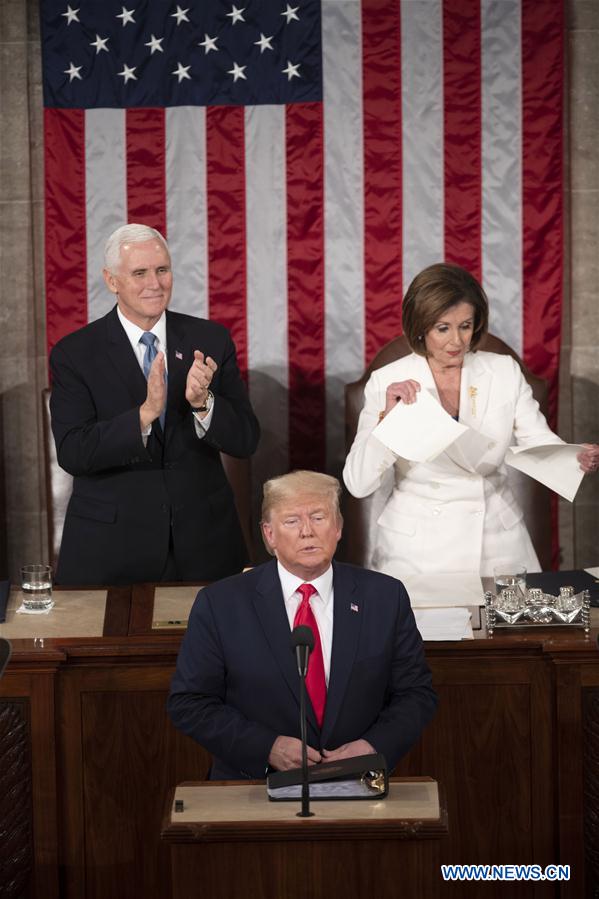President Trump acquitted - What's next for American politics?
- By Shi Weicheng
 0 Comment(s)
0 Comment(s) Print
Print E-mail China.org.cn, February 12, 2020
E-mail China.org.cn, February 12, 2020

What has been happening in American politics over the past few days will be remembered in history. While Trump's 2020 State of the Union Address (SOTU) failed to be the focus of widespread attention, some incidents stood out. Seared now in public memory is how Trump seemingly rebuffed an offer of a handshake from Nancy Pelosi, the Speaker of the House, and how Pelosi was seen ripping up a copy of Trump's speech on live television after the president's address. Both sides sharply criticized each other's “misconduct” after the event.
On Wednesday, President Trump was acquitted by the Senate on impeachment charges. The biggest drama of American politics has finally come to an end. However, that may not entirely be the case. The different political actors in DC have only become more polarized. Be it Trump's acquittal or the SOTU, we can clearly see how American politicians use these events to their advantage to create more chaos and worsen the situation.
The political situation has intensified. The Republican Party as well as Trump's allies and supporters have hailed his acquittal a big victory as expected, and proclaimed that they are proud of what Trump has done for America. Indeed, Trump has also made good use of these opportunities to pass a strong message to his political base, touting how his administration has created a booming economy and restored American values.
On the other hand, the Democratic Party's anxiety and anger have grown increasingly stronger. They are frustrated by how the Republican-controlled Senate blocked their attempts to subpoena new documents and witnesses for Trump's impeachment trial after many days of debates on the Senate floor. Based on the final count, Democrat and Republican Senators voted mostly along party lines, although Republican Senator and former 2012 presidential candidate, Mitt Romney, voted to support Trump's impeachment. This departure from the party line by such a prominent member of the party is somewhat unusual in American history.
For the Democrats, the task to persuade Republican senators to limit Trump's power is looking increasingly harder. Nevertheless, they are still vowing to continue doing their duty of providing oversight on President Trump and his administration. Therefore, the current political strategy is for democrat lawmakers to figure out a new plan of attack and coerce Trump's officials and former staff to appear before Congress as witnesses.
However, this strategy is a double-edged sword. Since the start of the impeachment proceedings, American voters seemed to show signs of political fatigue and turned instead to more bread and butter issues like health care. A potential threat to Democrats is how this strategy could backfire on them should they continue to push for more witnesses and public testimonies.
More importantly for the Democrats, their first primary on Monday did not go well. The original issues weren't solved and became mixed up in new problems that emerged. Just as the Democrats were waiting for the results from the first state party primary, the local Iowa Democratic Party told the country that they had some coding problems with the new app during the vote on Monday night.
This definitely aroused national criticism and anger with some even calling for Chairman Tom Perez's resignation. Even more awkward for the party is that the final result still remains unknown days later. The later the results come out, the more dangerous it is for the party because it could possibly lead to different campaigns attacking each other and undermining the party's overall unity.
Another worry is that the results of Democratic Party's first primary in Iowa did not seem to follow the party's playbook. According to the full results, there was not an outstanding winner actually, with Pete Buttigieg holding a narrow lead of 26.2% and Bernie Sanders of 26.1%. Moreover, the delayed results of Democratic caucuses in Iowa also caused confusion and discontent of voters, which will probably lead to unpredictability in the following primaries.
As such the next few battle grounds in the Democratic Party's ongoing primary will enter a more uncertain phase. The next state, New Hampshire, as well as “Super Tuesday,” are likely to attract unprecedented attention. Also, another concern is whether the Democrats' internal chaos will help Trump win the reelection in November. The protracted uncertainty and tight competition are certainly not helping the Democrats.
The current priority for the Democratic Party is to find a better way to integrate all their resources and win the general election. The Republicans, on the other hand, need to distance themselves from any possible and potential damage that the marathon impeachment trial may have caused, if they want Trump to be reelected.
In addition, what beleaguers American society is the nation's growing divide. Whoever is elected in November, be it Trump or a Democratic candidate, will face the hardest social and political challenge in American history – to heal the rifts in society and re-unite the American people once again.
Shi Weicheng is a visiting scholar at the University of Iowa. His research fields include U.S.-China relations, International Political Economy and emerging global governance.
Opinion articles reflect the views of their authors, not necessarily those of China.org.cn.
If you would like to contribute, please contact us at opinion@china.org.cn.






Go to Forum >>0 Comment(s)